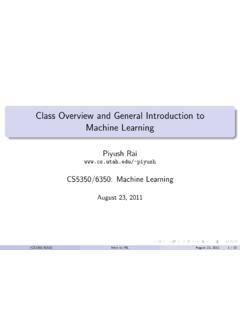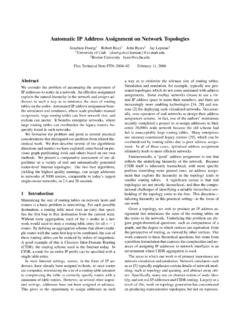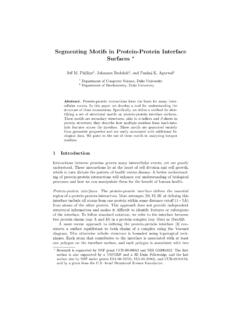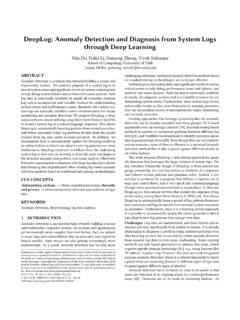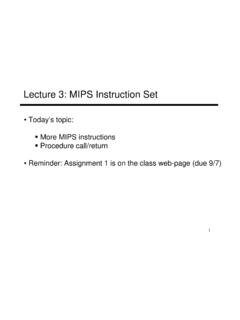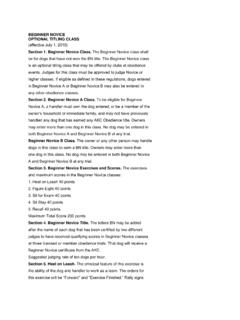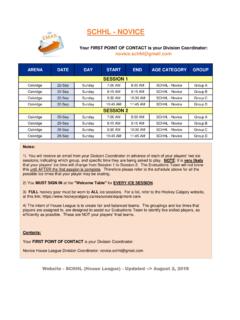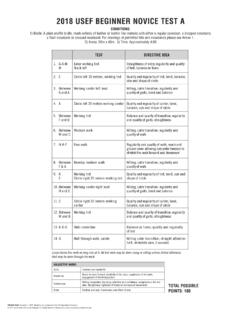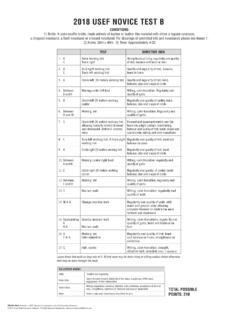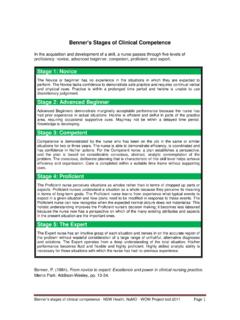Transcription of COMPUTER FUNDAMENTALS TRAINING - School of …
1 COMPUTER FUNDAMENTALS Copyright 1997 Sean Walton 1 HARDWARE: WHAT DO I NEED TO KNOW TO BUY A COMPUTER ? .. 5. PIECES ARE FOUND IN A COMPUTER ?..7. COMPUTER 10. 11. 11. 11. is 12. 14. 15. 16. 16. 19. DO I NEED?.. 20. on CAN I ADD LATER?.. 23. 25. Upgrades (Advanced)..26. Difficult Updates (Expert).. 27. 29. DO I SET UP MY COMPUTER ? .. 31. of the you have to install COMPUTER cards?.. 32. 32. any inserts for floppy/CD-ROM 33. (Building Your Own COMPUTER ) (Expert only)..33. : make sure you have everything!.. 33. 34. 34. Installation [functioning CD-ROM required].. 35. CARE OF COMPUTER (CPU, MONITOR, FLOPPIES, ETC.).. 36. 36. COMPUTER on .. 37. 37. 38. 39. 40. 40. temporary files (Windows, Netscape, ).. 41. 42. 42. Do I Upgrade?.. 42. SOMETHING GOES WRONG, WHO CAN I TALK TO?
2 44. 2 OPERATING SYSTEMS: HOW DO I WORK WITH THE COMPUTER ? .. 46. UP 47. WITH THE Input/Output 49. (Interfaces).. 50. 51. 1. is Compression? (Advanced).. 52. TYPES OF OPERATING SYSTEMS 54. WITH 56. 56. a 57. WITH 58. & 58. & common icons: their 59. printer/ 59. 59. 59. 59. vs. 61. 61. 62. your Hardware Configuration 62. Windows 95 Registry (Expert Only).. 63. (Turning Off) 63. 3 WINDOWS APPLICATIONS: HOW DO I ??? ON THE COMPUTER ? ..65. OPERATIONS FOR ALL 66. 66. files ..67. 68..70. , Cutting and Pasting .. 71..71. PROCESSORS: WRITE LETTERS, ETC.. 73. Fonts .. 74. Alignments .. 75. 76. 76. & Tool : Write a SHEET: MANAGE NUMBERS .. 79. is a spreadsheet? a cell?.. 79. 80. 80. a 81. Sum .. 81. 81. 82. 82. : Construct a Simple Checkbook : MANAGE DATABASES.
3 84. can I do with databases?..85. are they organized?.. 85. do I build a database?.. 86. do I query?.. 87. Do I Create an Input Form?.. 88. : Construct a home-storage : CREATE PRESENTATIONS ..90. : Make a sales pitch 91. 2. : PAINT PICTURES .. 92. are Pixel/Vector Graphics?.. 93. do I draw/write/edit/cut?..93. Lines, Boxes and 94. Some 94. and Editing 94. and 95. do I need to print/display/share my pictures?..95. 96. 96. : Make a 97. : WEB SURF ..98. Is the Internet? the Web? a Homepage?..99. Does It Have for Me?..100. Kinds of Things Can I Do?.. 100. Do I Surf the Web ? Search on Topics?.. 101. about Smut Pages ? How to Protect My Family?.. 101. About Security? Can People Do Things to Me?.. 101. 101. 101. 102. Other Suspicious 102. Services Are Available on the Internet?
4 102. Mail (EMail).. 102. 102. Relay Chat (IRC).. 103. 103. Phone (EPhone).. 103. 104. (Freenet [text only], CompuServe, AOL, ..).. 104. : Find some pictures of 104. 4 APPENDIX A: 106. 5 APPENDIX B: STANDARD WINDOWS 107. 6 LISTING OF 111. 7 LISTING OF 112. 113. 122. 3. Notes about this manual: It was my intent to make this useful and easy to use by everyone yes, even from those who have used a COMPUTER to those who have never touched one. Please note that it was written for those who have never touched a COMPUTER . Organization. This text tries to build on itself. I was very concerned about overload (too much information which leads to frustration) and even underload (too little which leads to confusion). Everything in the textual parts which are not flagged as Advanced or Expert are important to understand why the COMPUTER does certain things and why it can't do other things.
5 Please be patient and read through all of it. It is also intended to be a reference once you're done with the course. So, there are several Tables and Indices at the end of the text. Notation. You may see some interesting notations in this text. To help you, this notation tries to be consistent with COMPUTER manuals. For example, you may see <Enter>. This means (and all other angle-bracketed notes) a particular key on the keyboard (in this case, it means the Enter key to the right of the alphabetic keys). If you see <Ctrl-F> or <Alt-F4>, that means holding the <Ctrl>, <Alt> or <Shift>. key then pressing the other key ( <Ctrl-F4> means pressing the <F4> key while holding the <Ctrl> key). Also, Edit|Cut means under menu Edit' select option Cut'.
6 Suggestions. Suggestions are always welcome. I didn't design this course for me but for you. If there is anything that I can do to help you work with computers, please let me know. 1 HARDWARE: WHAT DO I NEED TO KNOW TO BUY A COMPUTER ? . What is a COMPUTER ? I guess the easiest way I can explain it is as a little machine that follows very specific instructions over and over. A COMPUTER cannot learn and, unless told to do so, won't respond to anything. Think of it as a very dumb dog that you have to teach to catch a ball every day and every time you want to Computers do very complex math. Mind you, it is always related to the basics: add, subtract, multiply and divide. But as anyone who has had algebra and calculus will tell you: if you do enough of these basics, you can get approximations of more sophisticated math that are pretty close to reality.
7 Computers do this math very quickly. Often these calculations are done in millions per second. Imagine multiplying 10 million pairs of multi-digit numbers per second. I have a hard enough time myself doing a 3-digit multiplication in less than a minute. Computers can store a vast amount of information and retrieve it at extraordinary speeds. When everything works correctly, this data is as fresh and unblemished by time as when it was first stored. It can record information about everything (given it has sufficient storage capacity). While this may not seem to be a great achievement, think about this: when you last went to the store, how much did you pay for each item you bought? Computers can store this kind of information a lot better than we can recall it.
8 Also, one of those CD-ROMs that we see so frequently can store the entire Encyclopedia Brittanica along with photos. (Please note that if you buy their CD-ROM set, it has more than just text and photos. So, the set has several CD-ROMs.). What have computers done for us? Consider the following: 1. Made the world incredibly smaller by facilitating communications. 2. Advanced science and medical discovery more in 10 years than in centuries of history. 3. Designed cars, roads, cities, clothing, etc. 4. Tested transportation long before the prototypes ever left their studios. 5. Exploded our imaginations with color and virtual reality. 6. Controlled our market-place and caused the Black Monday crash. 7. Hinted that a passenger aircraft over Saudi Arabia was an enemy and recommended firing on it.
9 8. Opened freedom of speech to areas all over the world via the Internet. 9. Abetted fraud, laundering and gambling. 10. 1. Today (12/4/96), I read plans to make machines more intelligent . A quote from Bill Gates, Microsoft CEO: If a human assistant works for you over a period of years, your efficiency in working with him gets dramatically better and he can anticipate your interests and you can use shorthand ways of communicating. With a COMPUTER today, even if you use it for a couple of years, you are basically working with it the exact same way. It's not learning in the way a human assistant would. On the simplest level, the next generation of computers would learn the kind of information you like to see. They're going to know how you are reacting to things, and essentially put together, for example, the kind of newspaper that meets your interests.
10 (Investor's Business Daily 3 Dec 96 A8). The list goes on and on. The COMPUTER has done a lot to shape the modern world some good and some bad. In all, it has been a great blessing when properly used. What can computers do for you? Well, hopefully, this text will show you. PIECES ARE FOUND IN A COMPUTER ? Jargon Term Definition Adapter Most of the time it refers to a card that plugs into the motherboard adding special capabilities not originally found on the COMPUTER . Other times it refers to tools to convert one connector type to another. Cables A thick wire that connects the COMPUTER to the external device or power. Cache An interface between the CPU and the memory (RAM and ROM). It helps the CPU keep running even though the RAM may be too slow.
